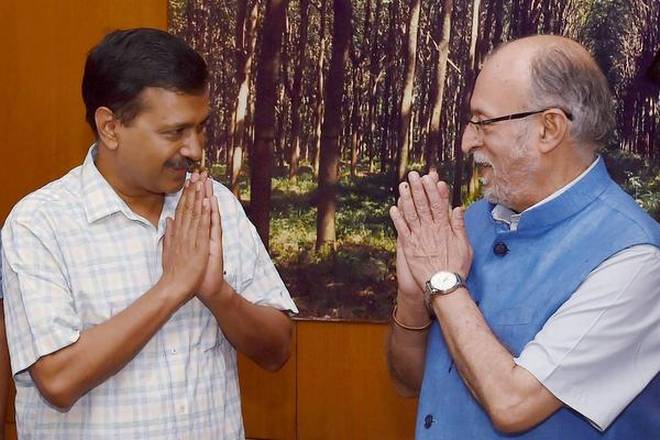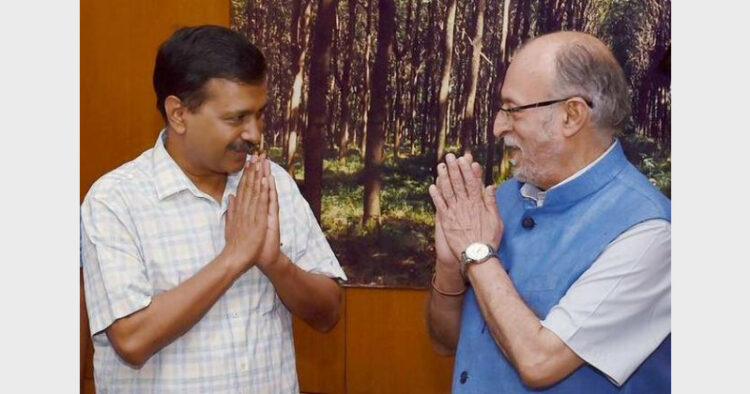
The Constitution Bench of the Supreme Court on the 4th of July, 2018 settled the law with regard to allocation of legislative and executive powers between the elected Delhi Government and the Central Government alongwith the administrator of the Union Territory of Delhi – the Lieutenant Governor. There are three judgements delivered. The principal judgement by Chief Justice with whom two other judges have agreed. Theoretically there is very little difference in the opinion of all the five judges and the law declared could be considered a unanimous opinion of the Supreme Court.
It would be both important and necessary to first analyse the law declared by the Supreme Court since various versions of what the Supreme Court has said have appeared in the media.
Delhi as a Union Territory
Delhi unquestionably is a Union Territory. Its power structure has to be separate and distinct. It is the seat of the Central Government, the Supreme Court, the Rashtrapati Bhawan, offices of the Central Government, embassies of foreign countries are located in Delhi, heads of foreign States are frequent visitors to Delhi. Who should, therefore, be controlling the law and order, police, land and various other facets of Delhi? After experimenting Delhi as part ‘C’ State and then as a Union Territory, a hybrid administrative structure for Delhi was conceived. Some powers, including police, public order and land, were vested in the Central Government and several other residuary powers were vested in the elected State Government. They were, however, subject to the keen eye of the Central Government in rare cases where power was not being appropriately used. It has been held by the Supreme Court that the proviso to Article 239AA of the Constitution is in the nature of a protector to safeguard the interests of the Union on matters of national interest in relation to the affairs of the National Capital Territory. It would be appropriate to construe the proviso as a protector of national concerns in regard to governance of the NCT. The Lieutenant Governor is a watchdog to protect them. The court has rightly observed that all the three institutions, the elected Government, the LG and the Central Government must work in harmony keeping the interest of the people and the national capital in mind. Cooperation, operating in their respective constitutional space and not confrontation should be the objective.
The Supreme Court’s Opinion
The Supreme Court has categorically ruled the following:
(1) The power in relation to police, public order and land shall vest exclusively in the Central Government. It can be exercised through the Lieutenant Governor and the elected State Government has no role in the exercise of these powers.
(2) The powers mentioned in the State and the Concurrent List will be exercised by the elected State Government. However, the Central Government [under the provision of Article 239AA(3)(b) being pari materia to Article 246(4)] shall also have the legislative power on all the subjects in relation to NCT Delhi.
(3) The elected State Government will have the executive and the legislative authority in relation to these powers. The Central Government simultaneously will also have the authority to legislate in relation to these powers. If there is an exercise of power by the Central legislature in relation to these powers, it will override the authority of the State legislature.
(4) The Lieutenant Governor of Delhi is bound by the aid and advice of the State Council of Ministers and has no independent power to overrule the power of the State Cabinet.
(5) It is incumbent on the State, however, to keep the Lieutenant Governor informed of the exercise of these powers.
(6) Ordinarily, in the larger interest of democracy and federal politics, the Lieutenant Governor should accept the exercise of power by the State. But if it has good and cogent reasons supported by material to disagree, he can record the same in writing and refer the same to the President (i.e. the Central Government), which will resolve the difference of opinion between the State Government and the Lieutenant Governor. The decision of the Central Government will be binding both on the Lieutenant Governor and the elected State Government. Thus hereto the opinion of the Centre is overriding. The opinion of the court gives due importance to the opinion of the elected State Government but maintains the primacy of the Central Government in the larger interest of the national capital.
Delhi is not a State and, therefore, there could be no assumption that powers which belong to State Government’s also belongs to the elected Government of the Union Territory. It has been specifically held by the Supreme Court that it is crystal clear that by no stretch of imagination, NCT of Delhi can be accorded the status of a State under the present constitutional scheme and the status of the Lieutenant Governor of Delhi is not that of a Governor of a State, rather he remains an Administrator, in a limited sense, working with the designation of Lieutenant Governor. The Council of Ministers being headed by the Chief Minister should be guided by values and prudence accepting the constitutional position that the NCT of Delhi is not a State.
The Judgement in terms of the Constitution
The judgement elaborates at length the constitutional philosophy behind the Constitution and reaffirms precisely the text of what the Constitution says. It does not add to the powers of the State Government or the Central Government nor does it in any way dilute the same. It emphasises at the importance of elected State Government, but Delhi being a Union Territory makes its powers subservient to the Central Government.
There are several issues which had directly not been commented upon but by implication there is some indication of those issues. However, unless issues of importance are flagged, discussed and a specific opinion is rendered, none can assume that silence implies an opinion in favour of one or the other. There are two obvious indications. Firstly, if Delhi has no police powers, it cannot set up investigative agency to investigate crimes as had been done in the past. Secondly, the Supreme Court has held categorically that Delhi cannot compare itself at par with other States and, therefore, any presumption that the administration of the UT cadre of services has been decided in favour of the Delhi Government would be wholly erroneous.
Since several versions of this judgement have appeared in the public space, I hope those who want to contribute to the public debate would read the judgement before commenting on it.














Comments